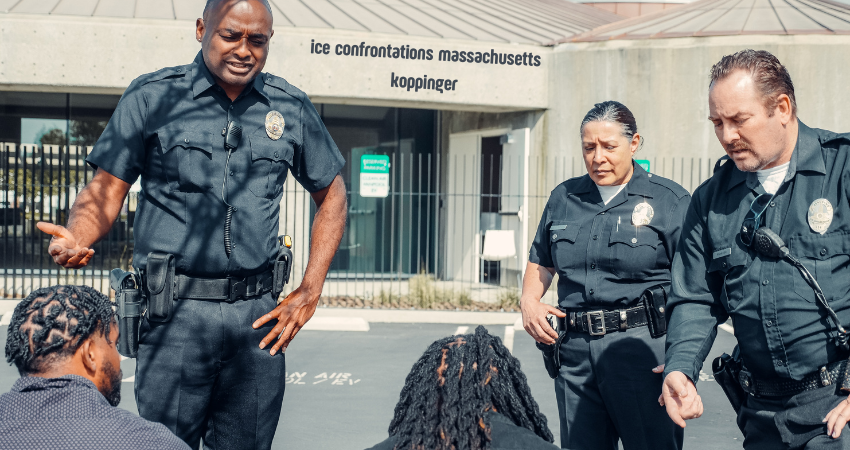In recent years, few topics have stirred as much anxiety and urgent need for clarity as dealing with ICE confrontations in Massachusetts. Especially after the high-profile Koppinger case, communities have been on edge, trying to balance everyday life with the constant possibility of sudden, life-changing encounters. This guide isn’t just another generic article. It’s a deep dive into what it really means to face ice confrontations massachusetts koppinger, what rights you truly have, and practical, heartfelt advice to protect yourself and your loved ones. Let’s walk through this together—because knowledge isn’t just power; it’s protection.
Understanding the Context of ICE Confrontations in Massachusetts
Ice confrontations massachusetts koppinger might not be the first place people think of when talking about ICE activity, but make no mistake—it’s here, and it’s active. The landscape is shaped by a combination of federal policies, local resistance, and unique historical moments like the Koppinger case. To truly master ICE confrontations, we need to understand the bigger picture first.
What is ICE and Why Does it Operate in Massachusetts?
ICE, or Immigration and Customs Enforcement, is tasked with enforcing immigration laws inside the United States. You might imagine ICE as only operating at borders, but in reality, their work often unfolds far from ports of entry. In Massachusetts, ICE has been particularly active because of the state’s mixed approach to immigration enforcement. On one hand, some cities and counties have declared themselves sanctuary jurisdictions, limiting cooperation with ICE. On the other hand, ICE still operates under federal authority and often targets communities they suspect may include undocumented immigrants.
Why Massachusetts? Its diverse immigrant population makes it a target. But there’s also the practical side: proximity to major international airports, bustling cities, and industries that employ large numbers of immigrants. ICE justifies its presence by citing national security and public safety, but critics argue it often disrupts families over minor violations, tearing communities apart.
The Koppinger Effect: How One Case Changed the Narrative
The “Koppinger Effect” refers to the ripple impact of a case where ICE detained an individual, Koppinger, despite local resistance. The case became a symbol of how ICE could bypass local sanctuary policies by using federal authority. While the details of Koppinger’s case are complex, its impact is simple: it shattered the illusion that sanctuary status alone could keep ICE out.
What made Koppinger’s case so powerful wasn’t just the legal details—it was the human story behind it. It illustrated how ICE could upend lives quickly and with little warning. More importantly, it sparked conversations in living rooms, churches, and community centers about what to do if ICE comes knocking. It moved the topic from policy debate to personal urgency.
By understanding the Koppinger Effect, we see why mastering ICE confrontations isn’t just a legal strategy—it’s about emotional preparedness, community solidarity, and clear-eyed awareness that even well-intentioned policies have limits.

Knowing Your Rights During an ICE Encounter
Knowing your rights isn’t just legal trivia—it’s your shield. Unfortunately, fear often makes people forget what they’re legally entitled to do (or not do). Let’s break it down clearly.
The Importance of Staying Calm and Collected
Imagine ICE knocking at your door at dawn. Panic is natural, but it’s also dangerous. Staying calm is your first defense because it keeps you thinking clearly. Officers might use intimidation, fast-talking, or even misleading statements to make you open the door or answer questions. Remaining calm lets you remember your training and your rights.
Breathe deeply. Speak slowly. Don’t argue or shout—conflict can escalate quickly. Calm doesn’t mean passive; it means deliberate. You have the right to ask for identification. You have the right to see a warrant before opening the door. Staying calm doesn’t just protect you legally; it protects your mental health too.
Practicing scenarios in advance helps. Role-play what to say. Have a script ready: “I do not consent to a search. I wish to remain silent. I want to speak to my attorney.” Calm is contagious—if you’re steady, family members might stay steady too. Fear fuels mistakes, but calmness creates space to think and act wisely.
Key Legal Rights Everyone Should Know
When it comes to ICE confrontations in Massachusetts—or anywhere in the U.S.—knowing your rights can make all the difference between staying safe and unknowingly giving ICE what they need to detain or deport you. The law might feel intimidating, but your rights are crystal clear, and you don’t need to be a lawyer to remember them.
Third, you have the right to legal representation. You can request to speak with an attorney before answering questions, and you should never sign any documents without understanding what they mean, ideally after consulting a lawyer. ICE may pressure you by saying “it’s faster” if you sign, but remember: your signature could waive your rights.
Finally, you don’t have to carry proof of citizenship or immigration papers everywhere—but if you do have them, keep them in a safe and separate place. Never carry fake documents; presenting false paperwork can cause serious legal trouble.
Difference Between a Warrant Signed by a Judge vs. ICE
This part is absolutely critical: not all warrants are equal. ICE often shows people what’s called an “administrative warrant,” usually labeled as Form I-200 or I-205. It might look official and even intimidating, but it’s not signed by a judge. It’s signed by an ICE officer—and that means it doesn’t give them legal authority to enter your home without your consent.
By contrast, a judicial warrant, signed by a judge, grants ICE the legal right to enter your home to arrest the person named. These typically look more formal, include a judge’s signature, court name, and often have language referencing probable cause.
Knowing this difference could literally keep ICE outside your door. Here’s a quick cheat sheet to remember:
| Type of Warrant | Signed by | Allows Entry into Home? |
|---|---|---|
| ICE Administrative | ICE officer | No, unless you invite them in |
| Judicial Search/Arrest | Judge | Yes, to arrest the named person |
If ICE shows up, politely ask: “May I see the warrant?” Read it carefully through a window or door peephole. Never open the door just to check—they can step inside the moment it opens.
Educating family and roommates about this difference is just as important; one uninformed person could accidentally let ICE inside, endangering everyone.
Practical Strategies to Handle ICE Confrontations
Beyond knowing your rights, you need practical strategies—real-world steps to follow when ICE shows up at your door, stops you in public, or questions you unexpectedly. This isn’t paranoia; it’s preparation.
How to Respond When ICE Comes to Your Door
Picture this: it’s 6 a.m., there’s a knock, and someone shouts “Police!” through the door. First rule: don’t open the door. Stay calm, remember your script, and speak clearly.
Ask through the door: “Can you show me the warrant?” If they show it, look for a judge’s signature. If it’s not there, say: “I do not consent to your entry.” Even if they keep demanding, you are under no obligation to open up.
Do not lie, argue, or try to run. Just ice confrontations massachusetts koppinger repeat your statement. If you have time beforehand, create an emergency plan: keep important documents in one place, list attorney phone numbers by the door, and tell family what to do.
If ICE enters anyway without a valid judicial warrant, don’t physically resist. Instead, clearly state: “I do not consent to this search,” and call your lawyer immediately. Document the event if possible—recording is legal in Massachusetts as long as one party (you) consents.
Having a prepared “red card” to hand over is also wise. It simply says you choose to remain silent and want to speak with a lawyer. It’s small but powerful—a silent statement of your rights.
What to Do if Stopped by ICE in Public
Ice confrontations massachusetts koppinger doesn’t just show up at homes—they also conduct street operations. Here’s how to handle it if ICE stops you on the street, bus, or train.
Stay calm and polite. Panic might escalate the situation or make you look suspicious. ICE will often ask questions first: “Where were you born?” or “Are you here legally?” You’re not required to answer.
Say clearly: “I am exercising my right to remain silent.” Don’t lie—lying can get you in trouble. Staying silent can’t.
If they ask to see your papers and you don’t have them, say: “I want to speak to my attorney.” Never show false documents. Carrying valid immigration paperwork (if you have it) is wise, but it’s optional if you’re undocumented.
ICE might try to intimidate you by stepping closer or threatening arrest. Even then, don’t run—running can give them a reason to detain you. Instead, remain calm, state your rights again, and call your attorney when possible.
If you’re in a group, speak up for others too—many people forget their rights under pressure. Practicing together as a community helps everyone stay safer.

Silence can feel unnatural—especially when someone in uniform demands answers. But remember: ice confrontations massachusetts koppinger on information you give them voluntarily. Silence isn’t rudeness—it’s a right.
Clearly say: “I am exercising my right to remain silent, and I want to speak to my lawyer.” After that, truly stay silent—don’t explain, don’t justify, don’t debate.
If ICE pressures you to sign documents, politely refuse until you’ve spoken to a lawyer. Signing without understanding can lead to fast-track deportation, even for those who might have legal relief available.
And remember: asking for a lawyer doesn’t make you look guilty; it makes you smart. It protects not just you, but also your family and community.
Community Support and Resources
No one should face ICE alone. Ice confrontations massachusetts koppinger has a strong network of immigrant advocacy organizations, legal aid groups, and local activists ready to help.
Massachusetts-Based Organizations That Help
Here are a few:
-
MIRA Coalition: Offers legal help, advocacy, and community workshops.
-
Greater Boston Legal Services: Free legal aid for low-income immigrants.
-
ACLU Massachusetts: Provides resources, “know your rights” cards, and legal defense support.
-
Irish International Immigrant Center (now Rian Immigrant Center): Legal help and community education.
-
Massachusetts Immigrant and Refugee Advocacy Coalition (MIRA): Policy advocacy and community training.
These groups do more than just react—they prepare communities proactively with workshops, legal clinics, and hotlines.


